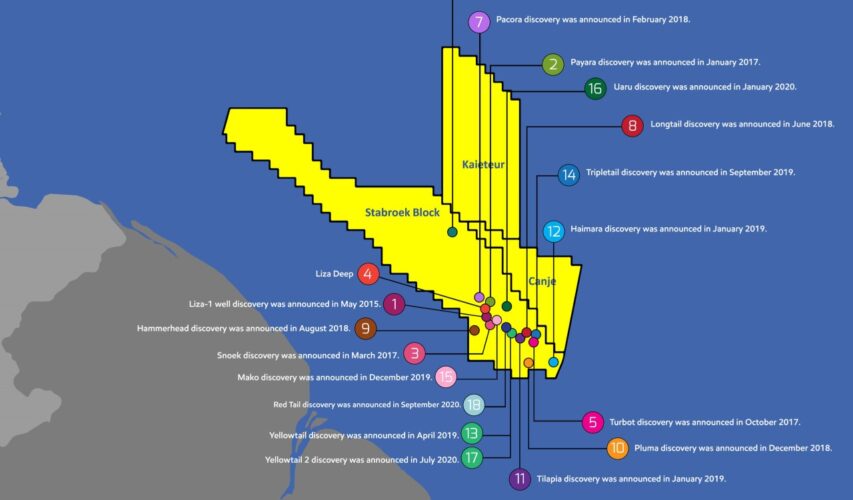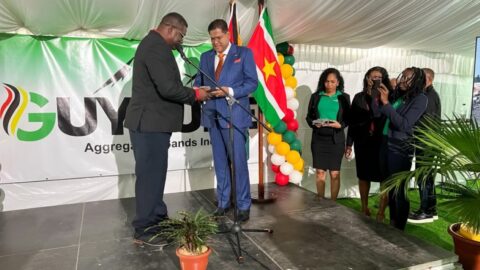Unveiling Exxon’s Influence: How the Company Transformed Guyana’s Oil Landscape
Blurring Boundaries: The Nexus Between Exxon and Guyana’s Government in the Quest for Oil Dominance
Guyana’s High Court delivered a groundbreaking ruling in May that implicated both the country’s Environmental Protection Agency (EPA) and Exxon Mobil’s subsidiary operating in the region. The case was initiated by Frederick Collins and Godfrey Whyte, Guyanese citizens who accused the EPA of neglecting to enforce its own permit requirements. Specifically, they argued that the EPA failed to secure a guarantee from Exxon or its subsidiary, Esso Exploration and Production Guyana Limited, ensuring that the company would cover all costs associated with a potential oil spill.
The significance of this case lies in the fact that Exxon’s drilling project in Guyana involves deep-water offshore drilling, a highly risky endeavor. Similar conditions preceded the Deepwater Horizon disaster in 2010, which resulted in a catastrophic oil spill in the Gulf of Mexico. Exxon’s own environmental impact assessments revealed that a similar incident in Guyana could impact 14 Caribbean islands, jeopardizing their fishing and tourism industries. The potential costs and damages would be astronomical.
Esso, along with the EPA, contended that the plaintiffs misinterpreted the law and that a mutually agreed-upon deal had been reached between the company and the agency. Moreover, they argued that Guyanese citizens lacked the standing to bring such cases. However, Justice Sandil Kissoon ruled in favor of Collins and Whyte, affirming that the permit requirements clearly mandated an independent liability insurance policy and an unlimited financial guarantee from Exxon to cover costs exceeding those covered by insurance.
The court’s scathing 56-page ruling chastised Esso for its disingenuous and deceptive behavior and accused the EPA of being derelict, pliant, and submissive. While this bold move targeting both the government and Exxon has raised concerns about Kissoon’s safety, it signifies that Guyana’s courts have not been influenced by the oil industry.
The intertwining of the oil company and the government in Guyana is concerning. Exxon executives often join the Guyanese president at cricket matches, and the vice president frequently defends the oil company during press conferences. Vincent Adams, a Guyanese petroleum engineer and former head of the country’s EPA, has been one of the agency’s most vocal critics, emphasizing the lack of oversight and transparency.
Exxon Mobil maintains that it has complied with all applicable laws and is committed to responsible development. Nevertheless, Kissoon ordered the EPA to take immediate action against Esso, demanding an unlimited financial guarantee from ExxonMobil and proof of sufficient liability insurance; otherwise, the drilling permit would be suspended. The EPA has appealed the ruling, and an appeals court judge temporarily stayed the order but required Exxon to provide a $2 billion guarantee in the interim.
Melinda Janki, the local attorney handling the case, has been working to halt oil drilling in Guyana for over a decade. Regardless of the outcome of the appeals process, she considers the ruling a significant victory for the people and a message that they possess the power to challenge such projects.
The situation in Guyana exemplifies a broader trend of extractive colonialism in the Global South. Countries with little history of oil and gas development are being coerced into these ventures just when the world needs to transition away from fossil fuels. Carroll Muffett, president of the Center for International Environmental Law, emphasizes the urgency of phasing out fossil fuels and the dangers associated with expanding oil drilling.
Read the full article!
Date: 18 juni 2023
Advertentie
Wilt u uw merk hier tonen?
Maak contact en ontdek de advertentiemogelijkheden!
Wilt u uw merk hier tonen?
Maak contact en ontdek de advertentiemogelijkheden!
– DISCLAIMER –
LocalContentSuriname.com is een portaal waar ondernemers, bedrijven en stichtingen zich willen presenteren. Deze website is niet verantwoordelijk voor de inhoud die op deze pagina getoond wordt. Alle informatie die op deze pagina wordt verstrekt, moet onafhankelijk worden geverifieerd. Er worden geen garanties of verklaringen gegeven voor de juistheid van de informatie. Ga naar veelgestelde vragen voor meer informatie.












